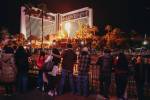Secret process
During a special meeting on July 8, members of the Henderson City Council voted unanimously to appoint UNLV administrator and former Henderson planning commissioner Debra March to the Ward 2 seat left vacant when longtime councilman Andy Hafen was recently elected mayor.
Council members narrowed the field of nominees from 14 to six using secret ballots.
Henderson City Clerk Monica Simmons said no appointment process is spelled out in state law or the city's charter, so the city turned to a process laid out in the book of parliamentary procedure known as Robert's Rules of Order.
That book may be handy for resolving disputes about how to elect a sergeant-at-arms for the local Elks club, but it has no standing to overrule Nevada law, which states that elected bodies must conduct the public's business in public, with certain specified exceptions, of which this is not one.
The Review-Journal filed a complaint with the Nevada attorney general's office over the council's appointment process. Though Henderson City Attorney Elizabeth Quillin said the city intends to contest the complaint, she also said late last week that "out of an abundance of caution," details of how each council member voted will be released this evening, just before Debra March is sworn in, to avoid possible legal problems should Ms. March's appointment be cast in doubt.
An interesting approach. But if state law requires that such deliberations and actions be done in public view -- as it does -- it's not clear that a secret and thus illegal appointment process can be "made legal," after the fact, simply by having existing council members "do their best" to remember and explain what they were thinking at the time.
Secret ballots are vital when citizens elect their representatives, or when employees decide whether to be represented by a union, because in those cases secret ballots prevent intimidation, coercion or rewards by powerful interests out to affect the results.
But the shoe is on the other foot when it is those in power -- like a local City Council -- trying to mask what they're doing from an electorate whose only power over them comes from the knowledge that can inform their votes at their next visit to the polls.
Review-Journal Editor Thomas Mitchell pointed out last week that when council members used secret ballots to appoint a new member, they violated the open meeting law, plain and simple. "They ought to go back and do it all again," he said.
The attorney general's office is reviewing the newspaper's complaint. Here's hoping that, If the law was indeed broken, both that finding and the stipulated remedy are forceful and clear. It may be true these council members "meant no harm," but bad precedents invite future abuses by those whose motives may be far from innocuous.























